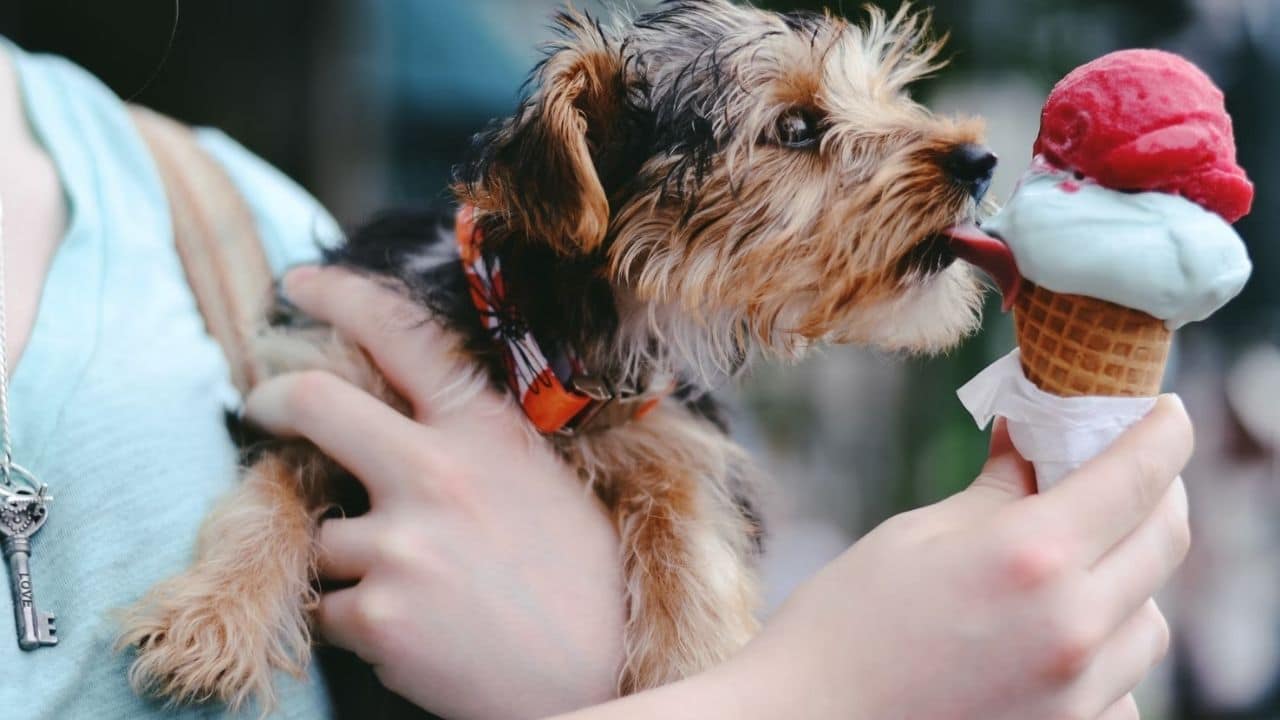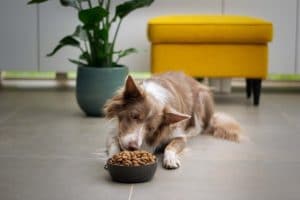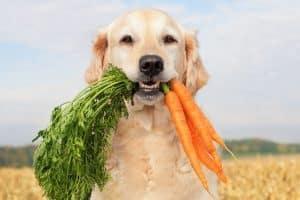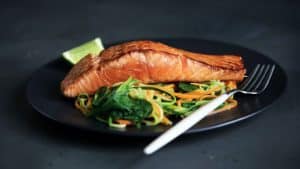Have you ever made a nice juicy steak or kept some sausages out in the open, and your dog couldn’t stop staring at the plate? Yeah, that’s the biggest telltale sign that your furball wants a taste of human food.
While your dog can safely eat some human food items, others are poisonous and/or indigestible to dogs. For instance, caffeine and chocolate are immediate no-gos.
It’s better to be safe than sorry. You don’t want to get tricked into handing the food off. It’s important to know which people foods to avoid giving your pet. Also, remember that moderation is the key, even with food items in a grey area.
Human Foods Your Dog Cannot Eat & Why
1. Salty Food
Don’t let your pup eat a lot of salty food. Chips in small amounts are fine, but their tolerance is much smaller than humans. Too much sodium can cause seizures and other issues.
2. Fruits & Vegetables
Some fruits and vegetables aren’t healthy for your doggo.
A. Avocados
A ” persin ” chemical substance in avocados can cause vomiting and diarrhoea in dogs.
B. Peaches & Plums
Peaches and plums aren’t bad for dogs if they’re fed in moderation. Be careful of the pit though as it’s a choking hazard. You don’t want it to get lodged in your dog’s throat..
C. Cherries
Cherry pits are another choking hazard and gastrointestinal (stomach) issue. They also have prussic acid (cyanide), which is toxic to dogs and humans (see also ‘Can Dogs Eat Stevia?‘).
D. Citrus Fruits
Citric acid, in large amounts, can cause central nervous system depression in dogs. Everything in citrus plants – stem, roots, seeds, and fruits – has traces of citric acid and essential oils.
Dogs can only ingest scarce amounts, but even that could potentially upset their stomach.
E. Grapes
Chemical compounds contained within grapes are extremely poisonous to dogs. Even small amounts can result in kidney failure and eventual death.
Raisins, sultanas and currants also fall into this category. Even a single grape or resin is enough to kill a dog.
3. Onions, garlic and chives
The entire onion family is hazardous to dogs. The compound known as thiosulphate is associated with severe anaemia and gastrointestinal problems.
Garlic is believed to be up to 5 times as toxic as onion for canines. It’s even worse for cats and certain Japanese breeds like Akitas. Symptoms often appear days after consumption. These include lethargy, severe diarrhoea and red-tinged urine.
Disclaimer: Onion is often a ‘hidden’ ingredient in food like sauces and gravies. It’s important to think twice before you give your dog any human food to eat.
4. Bread
A. White Bread
Take extreme caution feeding white bread to your dogs. The high oil and sugar levels are linked to pancreatitis and a host of other medical conditions.
B. Dough
Bread dough is extremely dangerous to dogs because of the yeast used for fermentation.
Yeast can cause the dough to keep expanding in your doggo’s stomach, causing bloating and ethanol production. The ethanol can even lead to alcohol poisoning.
Same goes for regular dough, bakery dough, pizza dough, etc. Anything containing yeast can expand in dogs.
5. Dairy Products
Dairy products have a lot of fat. Dogs don’t produce as much lactase as human to digest dairy. A few isolated incidents are more or less okay. Still, you should think twice about feeding dairy to your dog.
A. Ice cream
If your dog is lactose intolerant, don’t feed them ice cream. The high fat and sugar content can have serious complications as well.
B. Cheese
Cheese is one of those dairy products that might be OK for in moderation. Go with a low-fat or cottage cheese for a birthday treat.
A word of warning – if you don’t moderate feeding cheese and dairy to your dog, your furry friend can get a stomach ache and diarrhea.
Read More: Best Wet Dog Food of 2022 You Can Buy in the UK
6. Protein Sources
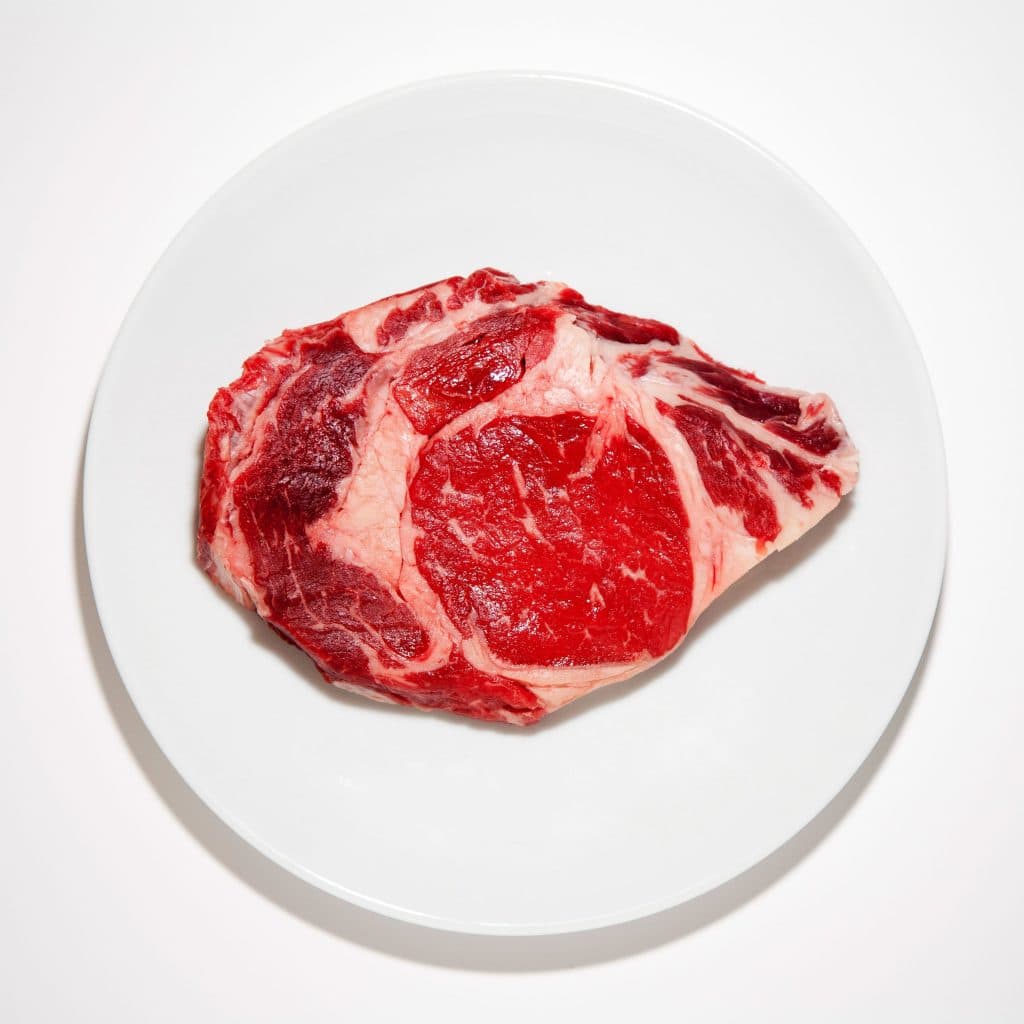
It’s a common misconception that anything “non-vegetarian” is edible to dogs. But make no mistake, that’s a myth.
A. Raw Eggs
Raw eggs are just as unhealthy as cooked eggs are nutritious. You should not feed raw eggs to dogs.
It can affect skin and coat health because of biotin deficiency in dogs. The Salmonella bacteria could easily be transferred to you as well.
B. Cooked Bones
There’s a key difference between cooked and uncooked bones (see also ‘Pros And Cons Of Dogs Chewing Cow Hooves‘).
Cooked bones are brittle because of boiling. This increases the chances of them breaking or splintering, severely hurting your dog.
Your dog could break their teeth or hurt the inside of its mouth. Or your dog could accidentally swallow the splinter and pierce the intestinal tract.
C. Raw or Undercooked Meat
Similar to raw eggs, undercooked or raw meat might lead them to transfer Salmonella and E. coli bacteria to you.
7. Confectionery Products
Confectionary products are a no-no for dogs.
A. Sugar-free Gum & Candy (or Any Products with Xylitol)
Don’t give your dog sugar-free gum / candy or artificial, low-calorie products. Almost all of them have a substance called xylitol (artificial sweetener) that’s harmful to dogs.
It spikes insulin levels, which means a sudden low in blood sugar levels, severe liver damage and even death.
B. Chocolate
Never feed anything containing caffeine to your dogs – not even chocolate. The methylxanthines in it are toxic to dogs. Risks include vomiting, seizures and even death in some extreme cases.
If you really want to, there are many chocolate treats manufactured in the UK specifically for dogs made from a chocolate substitute.
8. Beverages
A. Alcohol
Alcohol or alcohol-based substances are highly toxic for dogs. At best, it can cause stomach problems, vomiting and diarrhoea. At worst, it could lead to a coma or even death.
B. Coffee
As mentioned, your dog shouldn’t eat or drink caffeine.
C. Coconut Water
Coconuts have lots of potassium – so much that you shouldn’t give coconut water to dogs. Even excess amounts of coconut oil or flesh could cause vomiting and diarrhoea.
9. Other Common Products
A. Cinnamon
While cinnamon isn’t toxic quite as poisonous to dogs as other products in this list, large portions increase the risk of gastrointestinal problems.
B. Macadamia Nuts
It’s a shame, but macadamia nuts are toxic for dogs. Risks include vomiting, depression, weakness, hyperthermia, depression, and tremors in dogs. And it all happens pretty fast too – symptoms start showing just after 12 hours of ingestion and could last up to 2 days.
C. Corn on the Cob
Corn is fine but not corn on the cob. Dogs don’t have a problem digesting corn, but cob can get lodged in their throats if swallowed accidentally.
Read More: How to force-feed a dog who won’t eat?
Human Foods Your Dog Can Eat & Why They Should
Now that you know what to avoid, let’s look at people foods your doggo is allowed to eat.
Some of these items are in a grey area and must be fed in moderation. So you must take caution beyond just glancing over the descriptions.
1. Fruits & Vegetables
As noted before, fruits are super high in sugar and should be given to your dog in moderation.
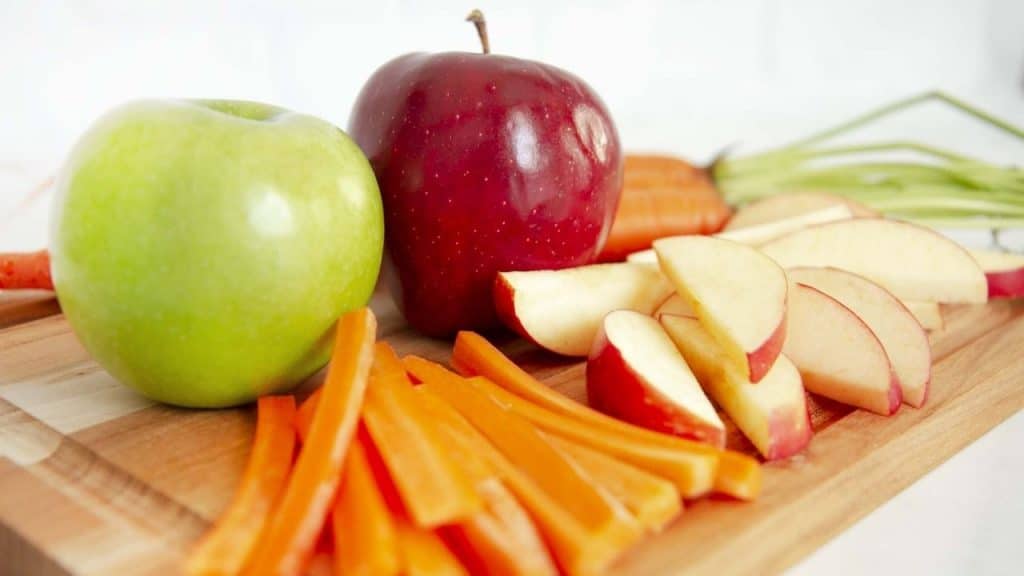
A. Apples
Apples are beneficial for dogs, but they shouldn’t be eating it every day. These fruits are rich sources of vitamin A and C.
Since apples are low in protein and fat, they come in handy when planning a diet for senior dogs.
B. Carrot
Carrots are an amazing addition to your dog’s diet. Both raw and cooked carrots aren’t only healthy but also yummy for your pup’s taste buds.
Carrots are sources of Vitamin A, minerals, and fibres that elevate the dog’s immune system. They’re also good for fur coats and skin. Plus, chewing on carrots is good dental hygiene. It removes plaque from their teeth.
Disclaimer: Cut the carrots into bite-size pieces to avoid choking incidents.
C. Watermelon
Watermelon is a good addition to your dog’s diet for the summer. The high water content keeps your furry ball of energy hydrated and provides vitamins A, C, and B6.
Disclaimer: Remove the rind and seeds before feeding watermelon to your doggo. The rind can upset the stomach, and the seeds can block the intestine.
D. Blueberries & Strawberries
Blueberries and strawberries are beneficial for senior dogs. They’re can reverse several age-induced issues in old dogs. They’re nutritious for pups and adult doggos as well.
They are a good source of pathogen-fighting antioxidants, fibre, and phytochemicals. Blueberries and strawberries are awesome choices for low-calorie snacks/treats while walking your dog.
E. Cucumber
Cucumbers are a good low-calorie snack for your dogs, like blueberries. They’re rich in vitamin K and some minerals.
F. Green Beans
Dogs can eat beans raw and cooked if they’re chopped enough to prevent choking. Green beans are important sources of calcium, iron, protein and vitamin K in canines.
G. Bananas
You can feed bananas to your dogs in moderation. They have high sugar content but are a delicious source of magnesium.
H. Other Fruits & Vegetables
Other acceptable fruits include pineapple (in small amounts) and coconut.
When given small amounts without extra ingredients, tomatoes, potatoes, and sweet potatoes are also allowed for dogs. The same goes for mango and honey.
2. Protein Sources (Meat)
A. Chicken
Chicken is a good source of digestible protein for dogs. You can feed it to your dog every day as long as it’s cooked. Plain boiled chicken without seasoning is also recommended for adult dogs with upset stomachs.
Speaking of good meat, lean beef is also allowed for dogs when moderated.
B. Fish
So, “fish” is a big a category in itself. Your dog can eat some types but not all.
Salmon and tuna are safe to feed your dog. They’re high in protein and omega-3 fatty acids, which are beneficial for your dog’s immune system.
Shrimp is also edible for dogs. Various vitamin B types in shrimp boost dogs’ blood circulation and digestive system.
Disclaimer: Avoid feeding raw, uncooked fish to dogs. Their bodies are host to several parasitic species.
Read More: How long can a dog go without food? What should you do?
C. Pork
Take caution when feeding pork to your dog. Only clean and cooked pork without spices and seasonings is recommended for dogs.
Uncooked pork could introduce harmful bacteria, and processed foods like bacon are almost dangerously high in salt content for dogs.
D. Turkey
You can feed your doggo’s skinless and boneless plain turkey, but it’s not meant for all dogs. See if your furball likes it first and adjust as needed. Otherwise, leave turkey off the plate.
3. Processed Food
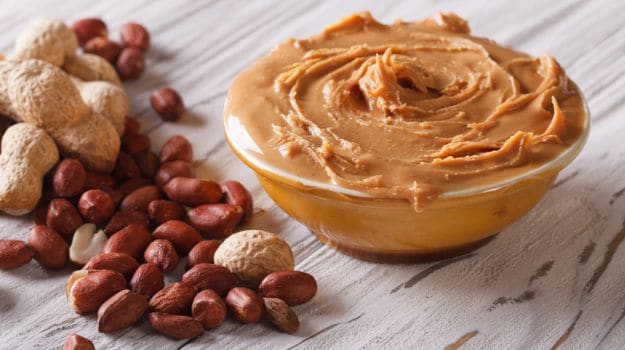
A. Peanut Butter
When eaten in moderation, peanuts and peanut butter are considered ok for dogs. Excess could potentially cause issues because of their high fat and calorie content.
B. Nuts & Dry Fruits
Unlike macadamia nuts, cashews and almonds are non-toxic to dogs. Although, I only recommend feeding occasional cashews to your dogs only because almonds aren’t easily digested.
Both cashews and almonds must be unsalted and unroasted.
Disclaimer: Nuts pose a serious choking hazard to dogs, so be careful.
C. Plain Popcorn
Plain and unsalted popcorn aren’t bad for dogs. But it’s only meant to be an occasional treat (see also our article on pigs ears), or it’ll cause big issues later on.
Popcorn with excess butter, salt or oil can lead to pancreatitis in dogs. Also, ensure your doggo is only eating fully-popped popcorns. The kernels are a choking hazard and can cause bad dental hygiene.
D. White Rice
Plain and cooked white rice is good for dogs. They’re essential when meal planning for sick dogs (with upset stomachs) and senior dogs. Also, white rice pairs well with boiled chicken!
Disclaimer: It can cause a spike in blood sugar levels, so avoid feeding it to a dog with diabetes.
Read More: Should you get a Poo Bin in the garden for your doggo?
Safety Tips for Letting Your Dog Eat Human Food
- Do your research before giving people food to your dog. Check if it’s harmful to the specific breed
- Find out if your dog has any allergies and which ingredients they may be allergic to.
- If your dog eats any poisonous foods, rush them to the vet immediately.
- Leftovers like excess fat and skin that are bad for humans are just as bad for dogs.
- Don’t forget this is only a “once in a blue moon” thing. Your dog’s regular diet should include food items intended for canines, not humans.
For a quick refernce, I recommend this awesome infographic produced by DogFoodSelector.
